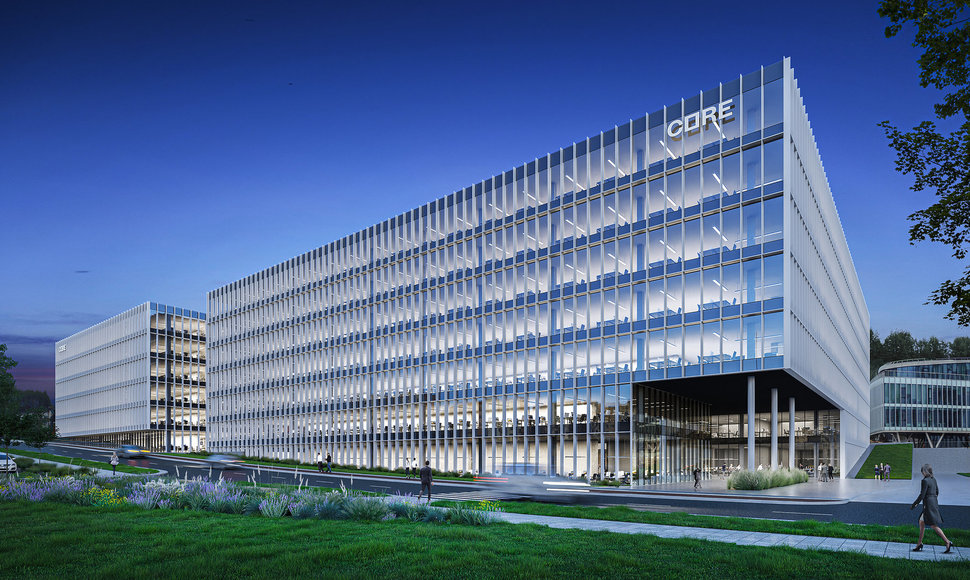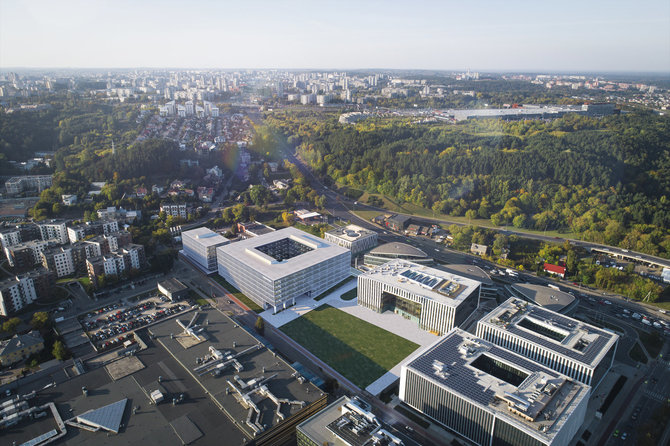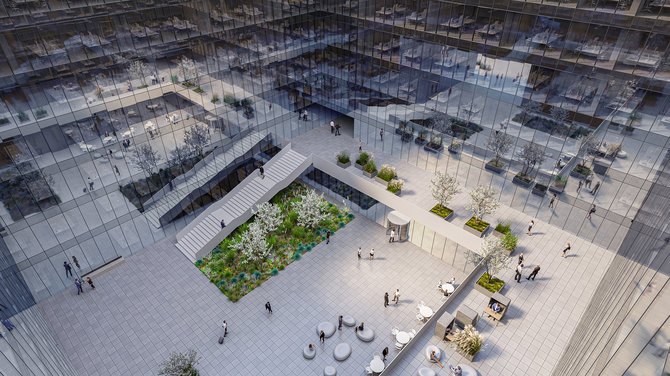Fitwel is the world’s leading building certification system, built on the installation of sustainability principles when it concerns people’s well-being and their relationship with the environment. In an effort to meet the requirements for Fitwel certification for the first time in the Baltics, the building developer plans to offer solutions like an outside sports space, meditation room, defibrillators and a nursing room, as well as special policies to control and test air quality and ventilation, together with other measures, which became more necessary during the pandemic.
Colliers International Advisors, a commercial real estate consultancy company, will be responsible for contact with prospective tenants and management of the business centre. Sandra Jovaišaitė, the Director of the Brokerage Department at Colliers, says that the new business centre should complete and connect the new Saltoniskes business zone, which has been forming for the past several years. With its open green courtyard, it should become the centre of the whole neighborhood.
“With the new border of the Vilnius centre growing west, CORE will rise in one of the most popular and easily-accessible spots in the city, half-way between the Old Town, the centre, and the city’s main transportation hubs, as well as the most important residential neighbourhoods,” said S. Jovaišaitė. “Employees will find CORE conveniently reachable not only by car, but also by public transportation, bicycle, or even on foot. One of the most important guiding principles in the development of the new business centre is maximizing employee wellness. Facilities and features like increased air quantities, healthy food options, fitness centre, good lighting, outside courtyard and working spaces, as well as the ability to reach the most important institutions on foot, together with security and the ability to reach the campus without using a car will allow CORE to become the first business centre in the Baltics to get certified according to the Fitwel standards, which evaluate tenants’ wellness and well-being.”
CORE aspires to meet the requirements for two out of the three available Fitwel stars. Aside from the measures mentioned above, employees will be encouraged to use the stairs and move on foot instead of relying on elevators, educational hand-washing signs will be installed in public areas and protocols for regular space cleaning will be provided to tenants.
Evaldas Savickis, the CEO of Vesta Consulting, a leading Baltic company consulting on sustainability certification, commented that the Fitwel standard is quickly growing in popularity worldwide. This trend is caused by people becoming more aware of the role the work environment plays when it comes to health, productivity, and wellness.
“Naturally, real estate developers have to meet higher and higher standards,” said E. Savickis. “As we realize that we spend the majority of our time inside, we are encouraged to modernize and convert these spaces to be friendlier towards the environment and ourselves. With the best practices from the West and Scandinavia in mind, we can already see the growth in the sustainability of our environment and buildings when it comes to the Baltics as well. We expect that the Fitwel standard will eventually become the market standard.”
According to E. Savickis, the number of Fitwel-certified buildings grows by 80% annually, with worldwide projects like the Bank of America Tower in Houston, USA, new Bloomberg HQ in New York, Cirque du Soleil International HQ in Montreal, Canada, and the new Arenastaden office for SEB in Stockholm, Sweden, having already met the Fitwel standard. Savickis says that Fitwel’s main difference from the other certificates (BREEAM and LEED) is that Fitwel is more concerned with the comfort, activity, and healthier environment for people spending time inside the building.
E. Savickis also points out that the COVID-19 pandemic touched the real estate market: there is already a noticeable demand for health, hygiene, and safety measures when it comes to buildings and the environment. Having spent more time inside than usual in the past several months, people started to better understand the importance of building quality and sustainability and how it relates to their physical and psychological health, so tenants and employees should pay more attention to their wellness and safety when inside once the quarantine is over.
“This means that real estate developers will have to not only ensure a good sense of well-being while spending time in the building, but also take care of safe contact measures for their tenants as well as a sustainable and psychologically nurturing environment,” said E. Savickis. “Fitwel has already renewed its list of requirements to account for the post-COVID-19 reality. The updated sustainability standard strategies include measures to minimize the spread of a virus by reducing physical contact, regularly cleaning, ventilating the building, and allowing for proper personal hygiene procedures. The Fitwel standard emphasizes that from now on, parties interested in getting certified will not only have to improve safety and hygiene after the quarantine is over but also inspire trust from their employees and tenants, optimize the work environment by utilizing high-quality indoor air, greenery, and the environment. Fitwel also mentions the subject of social health factors, with an eye towards improving people’s resistance to disease, ensuring quality healthcare and catering, as well as proper mental health.”
Baltijos Gildija picked experienced partners to design, build, and finish the project. The architectural solution came from Architekturos kurybine grupe, which has been responsible for multiple successful business centres. The structural work will be carried out by INHUS, with the finishing touches by KG Constructions.
The CORE business campus will consist of two connected buildings. The building’s total area will be 62,000 sq. m, with gross leasable area of 35,000 sq. m, and 4,570 sq. m sized floor plate of contiguous space. According to S. Jovaišaitė, CORE will also be designed to provide maximum flexibility to its tenants. It will have space for big clients but the smallest office spaces available will start at 100 sq. m.
“We believe that our tenants will value other modern and productivity-conscious solutions like raised floors, quality materials, energy efficiency meeting the BREEAM in Use standard, as well as smart Building Management Systems,” said S. Jovaišaitė.
CORE should fit into the functioning business ecosystem nearby and become its centrepiece. The new business campus will be connected to its neighbours by pedestrian lanes and open green zones, which will unify it with the leading banks, tech, press, and entertainment companies in the vicinity.














